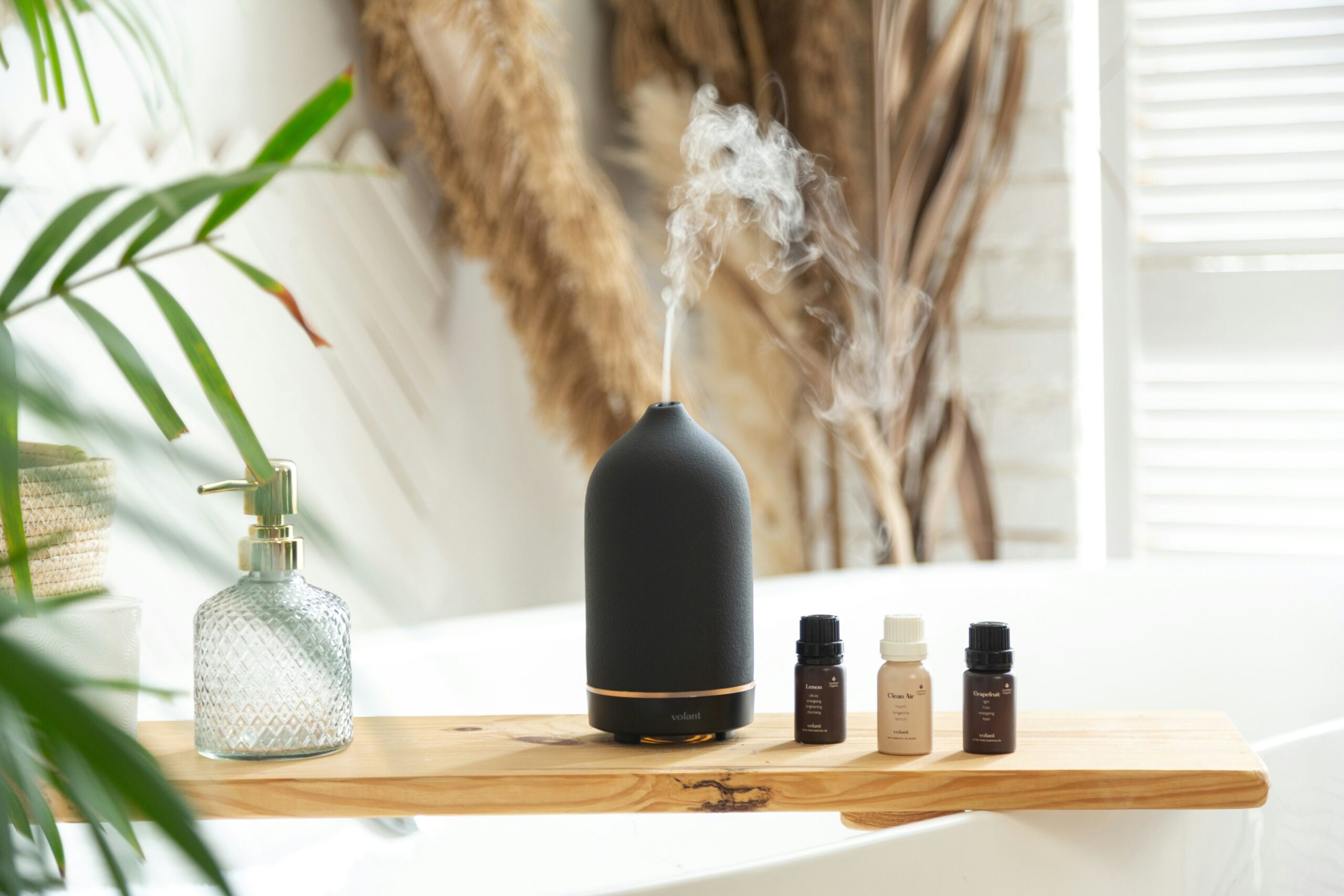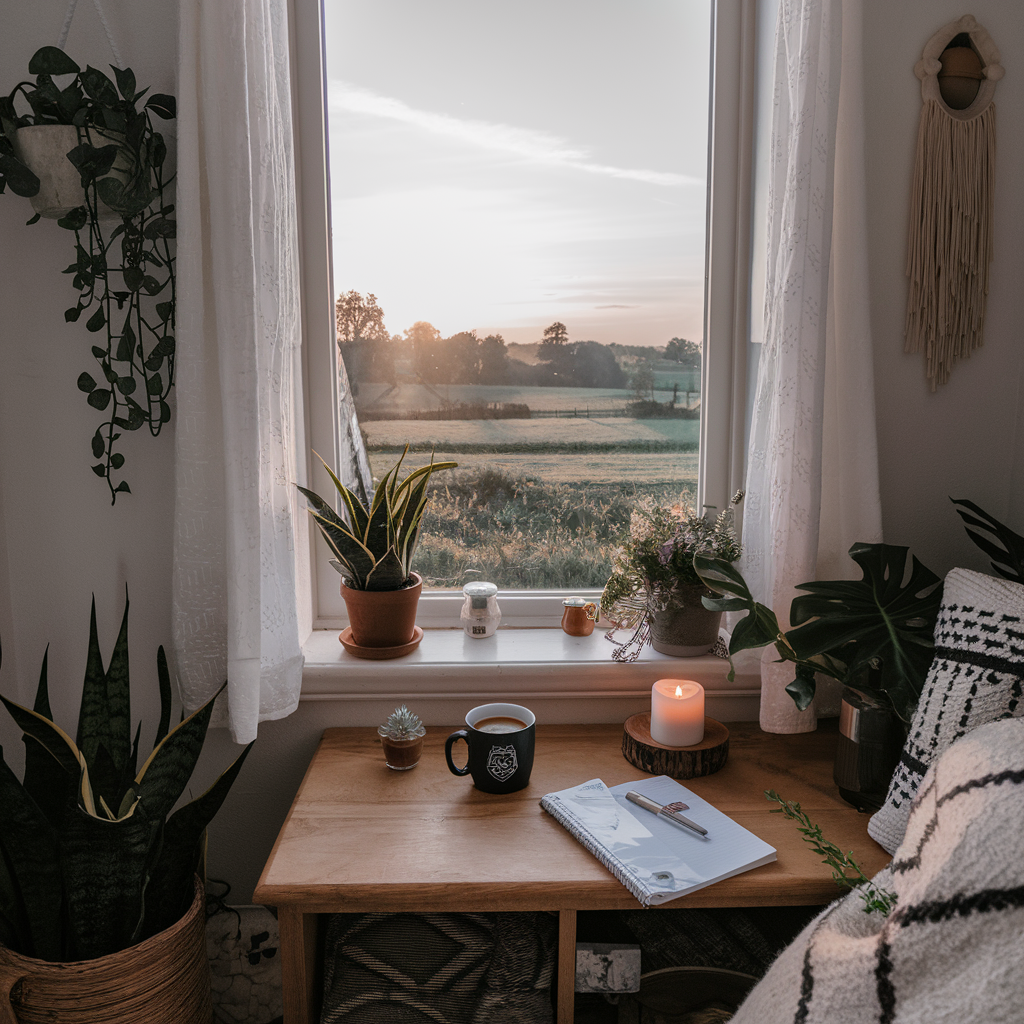Thriving as an Introvert in a World That Feels Too Much

Life can feel overwhelming sometimes, can’t it? Especially for introverts. The constant buzz of notifications, packed schedules, and endless noise in our modern world can be utterly exhausting. It’s as if the world was designed for people who thrive in chaos while we’re left searching for a quiet corner to hide in.
Thriving as an introvert isn’t about keeping up with the whirlwind of the world. It’s about finding ways to create calm within the storm, carving out space to recharge, and embracing who we are rather than forcing ourselves to fit a mould.
This article is here to help with exactly that. Together, we’ll explore practical, mindful strategies for introverts, tools that will help you find balance, grow in ways that feel authentic, and ultimately thrive. Whether it’s simplifying your routine, prioritizing solitude, or learning how to set boundaries, you’ll walk away with actionable steps you can start today.
Why Chaos Feels Different for Introverts
The difference lies in how we process dopamine, the brain’s reward chemical. Extroverts have brains that crave higher levels of dopamine, which makes them thrive in lively, stimulating environments like parties, busy offices, or social gatherings. Introverts, on the other hand, are more sensitive to dopamine, which means we can quickly become overstimulated when there’s too much happening at once.
Life can often feel different for introverts because our brains react uniquely to stimulation. This isn’t about comparing or judging ourselves or others, it’s about recognising our differences and understanding what we need to feel centred to thrive in a world that doesn’t always cater to our quiet nature. Recognizing this allows us to embrace our individuality and create the balance we need for a fulfilling life.
Mindful Strategies for Thriving as an Introvert
While the world may feel like an endless whirlwind of activity, thriving as an introvert is entirely possible with the right strategies. Here’s seven practical and mindful ways to find balance, restore calm, and grow in a way that feels authentic to you.
Create Predictability with Routines:
A Calm Anchor for Introverts.
As an introvert, you might crave a sense of calm in a world that often feels chaotic and overstimulating. One of the simplest yet most transformative ways to create that calm is by establishing predictable routines. Routines act like a gentle anchor, providing control, stability, and comfort to help you navigate your day with intention and ease.
Why are routines so powerful?
Predictable patterns reduce decision fatigue, soothe your nervous system, and creates a sense of security that allows your mind to focus on what truly matters. For introverts, this means more energy to invest in the things that bring you joy, creativity, and peace.
Start Your Day with a Gentle Ritual
Begin with a calming activity that sets a positive tone for the day.
- Sip your morning coffee or tea while journaling your thoughts or intentions.
- Stretch or practice gentle yoga for 10 minutes.
- Step outside for fresh air and a moment of mindfulness.
Structure Your Work Time
Whether you’re working remotely or commuting, create a rhythm that maximizes focus and minimizes overstimulation:
- Block your most productive hours for deep work.
- Schedule breaks every 60–90 minutes to recharge your mental energy.
- Use noise-cancelling headphones or calming music to maintain focus.
Create an Evening Wind-Down Routine
Transition from the busyness of the day to a restful evening:
- Power down all screens 30–60 minutes before bed to signal relaxation.
- Read a calming book, meditate, or enjoy a creative hobby.
- Reflect on your day and jot down three things you’re grateful for.
Prioritize Consistency Over Perfection
- Life happens, and that’s okay! The goal isn’t to stick rigidly to a schedule but to create flexible habits that ground you.
- Start small and build routines gradually so they feel natural rather than forced.
Set Weekly Reset Moments
Dedicate time once a week to prepare for the days ahead:
- Plan your meals or prep ingredients to save energy later.
- Outline your key priorities for the week.
- Declutter your workspace to create a peaceful environment.
Adapt Routines to Your Energy Levels
Embrace your natural ebb and flow of energy throughout the day:
- Do you feel most creative in the morning? Reserve that time for tasks that require focus.
- Feeling drained by mid-afternoon? Schedule low-energy activities like admin work or errands.
Routines don’t have to be rigid to be effective. The beauty lies in their ability to simplify your life and free up mental bandwidth, giving you the space to nurture what matters most.
Pro Tip: Start small. Add just one ritual to your morning or evening routine, and notice how it makes you feel.
For a deeper dive into how routines benefit introverts, explore my post, Why Your Brain Loves Routine. You’ll learn the neuroscience behind predictability and practical ways to incorporate it into your life.
Routines are not cages; they’re the keys to a calmer, more focused life.”
Simplify Your Physical and Digital Spaces:
A Clearer Mind for Introverts
As an introvert, your environment plays a significant role in your mental well-being.
Clutter, whether it’s a messy desk or an overflowing email inbox can feel like a constant hum of overstimulation, draining your energy and making it harder to focus or relax.
Enter mindful minimalism, a lifestyle approach that goes beyond aesthetics. By intentionally reducing clutter, both physical and digital, you create a space that promotes calm, focus, and clarity. A serene environment isn’t just visually appealing, it’s like a deep, cleansing breath for your brain.
Start Small and Build Momentum
You don’t need to overhaul your entire home or inbox overnight. Start with one area and let the results inspire you.
- Your desk: Clear off everything except essentials like a lamp, notebook, and one or two decorative items.
- A single drawer: Declutter it by removing anything broken, unused or no longer needed.
Create a Decluttering Habit
Dedicate just 10 minutes a day to tidying one area. Small, consistent actions make a big difference over time.
- Unsubscribe from five emails you no longer read.
- Delete 10 unnecessary files or screenshots from your phone or computer.
- Sort through one pile of paper clutter.

Designate a ‘Calm Zone’
- Keep this area simple and serene by regularly decluttering and only adding items that bring you peace, like a cozy blanket, a plant, or a candle.
- Choose one space in your home or office as a clutter-free sanctuary where you can recharge.
Set Boundaries for New Items
- Physical space: Before bringing something new into your home, ask yourself, “Do I truly need this?”
- Digital space: Resist downloading unnecessary apps or saving files you won’t revisit.
Declutter Digitally
Digital clutter can be just as draining as physical mess.
- Organize your inbox by creating folders for essential emails and archiving old ones.
- Set aside 15 minutes to delete apps or files that no longer serve you.
- Turn off non-essential notifications to reduce mental distractions.
Adopt a One-In, One-Out Rule
- For every new item you bring in, whether it’s clothing, a book, or a digital file let go of something similar. This rule prevents clutter from sneaking back into your life.
Focus on Functional Minimalism
- Minimalism doesn’t mean owning nothing, it’s about owning what serves you. Keep the items that genuinely add value or joy to your life and let go of the rest.
Create Maintenance Routines
Regular maintenance keeps clutter at bay:
- Weekly: Dedicate 15 minutes to tidying up your desk or workspace.
- Monthly: Review your subscriptions (both physical and digital) and cancel anything you no longer use.
- Quarterly: Do a seasonal purge of items you haven’t touched.
For a deeper dive into how minimalism fuels personal growth, explore my post Minimalism for introverts: Fueling Peace, Focus and Personal Growth. It’s packed with insights and inspiration to help you simplify your life and thrive.
The Benefits of Simplifying
When you reduce physical and digital clutter, you create more mental space to focus on what truly matters, whether it’s your personal growth, creativity, or simply enjoying a quiet moment with a cup of tea.
Decluttering isn’t just about tidying up, it’s about reclaiming your peace and energy. Start small today, and watch how simplicity transforms your space and your mind
“The more we simplify, the more space we create for what truly matters.”
Practice Mindful Escapes:
Your Introvert Reset Button
Life can feel like an overwhelming whirlwind, especially for introverts. Whether it’s the constant buzz of notifications, the chatter of a busy household, or the demands of work, sometimes you simply can’t escape the chaos around you. That’s where mindful escapes come in, your secret weapon to find calm amidst the storm.
A mindful escape is a deliberate pause, a chance to step away and recharge. It doesn’t require hours or elaborate plans. Simple, soothing activities can make a world of difference. For me, there’s nothing quite like walking to my local coffee shop for a hot chocolate, soaking in the serenity, can shift my mood completly.
Let’s dive into actionable ways to incorporate these little moments of peace into your daily life.
Reconnect with Your Breath
Your breath is always with you, making it the perfect tool for instant calm. Try this simple breathing exercise:
- Inhale for a count of four.
- Hold your breath for a count of four.
- Exhale slowly for a count of six.
- Repeat for 1–2 minutes whenever you feel overwhelmed.
Take a Nature Break
- Nature has a magical way of grounding us. Step outside for a walk, even if it’s just around the block.
Quiet tip: Pay attention to the sights, sounds, and smells around you. This mindfulness amplifies the calming effects.

Create a “Tea and Silence” Ritual
- Brew your favourite tea, sit in a quiet spot, and focus on savouring each sip.
- Let the warmth and aroma anchor you in the present moment.
Try a Guided Meditation
- Apps like Calm, Insight Timer, or Headspace offer quick meditations specifically designed for stress relief.
- Even five minutes of mindfulness can make a big difference.
Plan a Quick Escape to a Local Spot
- Identify a calming place nearby, a park, a coffee shop, or a quiet bookstore.
- Take a short trip there whenever you need to reset.
Incorporate Movement
Gentle physical activity can help release tension and improve your mood:
- Take a slow, mindful walk and focus on your steps.
- Try stretching or a short yoga flow to loosen tight muscles.
Engage Your Senses
Calm your mind by stimulating your senses:
- Light a scented candle or use essential oils like lavender or eucalyptus.
- Listen to soothing music or nature sounds.
- Hold a warm cup of tea or a soft blanket to ground yourself.

Prepare a Mindful Escape Kit
Pack small items that help you reset when you’re on the go:
- A small journal to jot down thoughts or doodle.
- Noise-cancelling headphones.
- A calming playlist or audiobook.
Practice Visual Escapes
- If you can’t physically step away, visualize a calming scene in your mind.
- Picture yourself walking along a beach, sitting by a tranquil lake, or strolling through a lush forest.
End Your Day with a Mindful Moment
- Before bed, take five minutes to practice gratitude or reflect on one positive thing from your day.
- This helps calm your mind and set the tone for restful sleep.
Why Mindful Escapes Work
These intentional pauses help regulate your nervous system, pulling you out of fight-or-flight mode and into a state of relaxation. They’re especially effective for introverts, who often feel overstimulated in busy environments.
Mindful escapes don’t need to be grand gestures, they’re about finding small, manageable ways to reset and recharge throughout your day.
Next time you feel overwhelmed, try one of these escapes. Your mind and body will thank you!
“Mindful escapes aren’t about running away; they’re about returning to yourself.”
Build in Solitude to Recharge:
Prioritize Yourself
For introverts, solitude is as vital as sleep. It’s not just a preference, it’s a necessity. Time spent alone helps you recharge, process your thoughts, and regain the energy you need to navigate the world. Yet, in a culture that glorifies busyness, carving out solitude often feels like a luxury.
Here’s the truth: solitude isn’t selfish, it’s self-care.
Imagine giving yourself permission to enjoy an hour of uninterrupted reading, a peaceful evening walk, or even just sitting quietly with your thoughts. These moments are not indulgences, they’re lifelines. Without them, the overstimulation of daily life can lead to burnout, irritability, and fatigue.
Making solitude a non-negotiable part of your routine is one of the most loving things you can do for yourself. Here’s how to make it happen.
Treat Solitude Like an Appointment
- Use your calendar to block out regular “me time.”
Treat these blocks as sacred, unbreakable appointments with yourself. Make them as non- negotiable as an important meeting
Example: Schedule 30 minutes each morning for quiet reflection or a 15-minute evening wind-down ritual.
Create a Solitude Ritual
Design a simple, soothing activity you can do during your alone time.
- Journaling about your day or emotions.
- Reading a book with a cup of tea.
- Listening to calming music while gazing out the window.
Plan Solitude Breaks into Your Day
Don’t wait until you’re drained to recharge. Incorporate mini solitude breaks:
- Step outside to enjoy some fresh air and silence
- Take a 10-minute walk during your lunch break
- Close your office door (or use headphones) for a few minutes of quiet reflection

Set Boundaries Around Your Alone Time
Let others know when you need uninterrupted time.
- Use a “do not disturb” sign or block notifications on your phone.
Pro tip: Frame it positively, like “I’m taking some quiet time to recharge so I can be at my best later.”
Create a Solitude-Friendly Space
Dedicate a specific area of your home as your sanctuary.
- A reading nook with cozy blankets and soft lighting
- A meditation corner with a cushion and calming scents like lavender.
- A quiet spot in your garden or balcony.
Incorporate Solitude into Everyday Activities
Even mundane tasks can be moments of quiet reflection:
- Turn dishwashing into a mindful activity by focusing on the sensations of the water and soap.
- Take a solitary drive without music or podcasts, allowing your mind to wander.
- Grocery shop at quieter times for a more peaceful experience.
Balance Solitude with Connectivity
Recognize when you need solitude versus social connection. Use your energy levels as a guide:
- Feeling overstimulated? Take time alone.
- Feeling recharges? Enjoy time with others but plan downtime afterward.
Plan a Solitude Day or Retreat
Dedicate an entire day (or at least a few hours) to solo activities:
- Visit a quiet park, museum, or library.Have a “silent day” at home with no screens or interruptions.
- Try a solo creative activity like painting, writing, or gardening.
Use Technology to Your Advantage
- Set your devices to “focus mode” or use apps like Forest to minimize distractions.
- Try a guided meditation app for a quick recharge if you’re short on time.
Reflect on Your Solitude Needs Regularly
Solitude needs can change based on your life circumstances. Check in with yourself weekly:
- Are you getting enough alone time?
- How does your solitude routine feel, energizing or restrictive?
- Adjust as needed.
Why Solitude Matters for Introverts
Solitude is the reset button for your mind, body, and soul. It allows you to reconnect with yourself, regain energy, and approach life with greater clarity and calm. By intentionally building solitude into your daily routine, you’re giving yourself the space to thrive in a world that often feels overwhelming.
For more inspiration and practical tips, explore my post Burnout is real why introverts need more downtime to thrive to learn how carving out alone time can transform your energy and mindset.
Take the time to recharge, you deserve it. The world will still be there when you’re ready to return, stronger and more centered than before.
Reframe Social Boundaries:
Protect Your Energy Without Guilt
Setting boundaries is one of the most empowering things an introvert can do to maintain emotional balance and manage overstimulation. Yet, it often feels uncomfortable. Many of us worry about seeming rude or selfish, but setting clear, kind boundaries is an act of self-respect, not something to apologize for.
Think of boundaries as a way to define what’s okay and what’s not, both for yourself and others. They help you save your energy for what matters most, whether it’s meaningful relationships or the solo time you need to thrive. Here’s how to make setting boundaries a stress-free part of your life.
Understand Your Energy Limits
Reflect on what drains or replenishes your energy. Ask yourself:
- How much social interaction feels manageable in a week?
- What types of interactions leave me feeling fulfilled versus depleted?
- Use these insights to define your personal limits.
Give Yourself Permission to Say No
Remind yourself that “no” is a complete sentence. Saying no doesn’t make you selfish, you are just protecting your energy.
- Practice self-affirmations like:
- “It’s okay to prioritize my needs.”
- “By setting limits, I’m showing up more authentically in my relationships.”
Create Your Go-To Scripts
Having prepared responses makes declining invitations or setting boundaries easier. Try these:
- “I’d love to, but I need some time to myself.”
- “Thanks for inviting me, but I already have plans.” (Your plans can include Netflix and snacks…. no one needs details!)
- “I’ve had a lot on recently. Can we plan something for next week instead?”
- “I appreciate you thinking of me, but I’ll have to pass this time.”
Set Boundaries with Empathy
Frame your boundaries in a way that shows appreciation for others:
- Instead of “I don’t want to do that,” say “That’s not something I can commit to right now, but I hope it goes well!”
- Acknowledge their invitation: “Thank you for including me. I need some downtime, but I’d love to catch up soon.”
Limit Time in Overwhelming Social Situations
If you must attend a large gathering, plan an exit strategy:
- Set a time limit for how long you’ll stay.
- Arrive early and leave before the crowd peaks.
- Use a code phrase with a close friend or partner to signal when you’re ready to go.
Balance Quality and Quantity
Focus on fewer, more meaningful interactions rather than spreading yourself too thin:
- Opt for coffee with a close friend over attending a large party.
- Prioritize deep, one-on-one conversations over surface-level chatter.
Action Step: Write a short list of people who uplift you. Make time for them and feel okay stepping back from relationships that drain you.
Create Buffer Time
Build downtime into your schedule before and after social events:
- Before: Spend 15 minutes meditating or journaling to centre yourself.
- After: Plan a quiet evening to decompress, whether it’s a bath, a book, or some alone time.
Set Clear Communication Expectations
Manage communication boundaries with friends, family, or coworkers:
- Let them know if you don’t always respond to messages right away.
- Example: “I sometimes need extra time to reply, but I value our conversations.”
- Use tools like “Do Not Disturb” mode or auto-reply messages to protect your quiet time.
Embrace JOMO (Joy of Missing Out)
Replace FOMO (Fear of Missing Out) with JOMO:
- Celebrate the joy of skipping events that don’t align with your energy or interests.
- Remind yourself that saying no to one thing often means saying yes to something better…. your well-being.
Check In with Yourself Regularly
Periodically assess whether your boundaries are working:
- Are you feeling less drained or overwhelmed?
- Do you need to adjust your limits with certain people or situations?
Remember, boundaries aren’t static, they evolve as your needs change.
Why Boundaries Matter for Introverts
Boundaries are the bridge between thriving and simply surviving as an introvert. When you set limits that honour your energy, you build healthier relationships, with others and yourself. Over time, these boundaries not only protect your peace but also empower you to show up more fully in the moments that truly matter.
Set limits with grace, and watch how much more joy and energy you uncover in your life.
Celebrate Your Wins:
Big, Small, and Everything in Between
As introverts, we often downplay our achievements, brushing off progress as “no big deal.” But every step forward, no matter how small, deserves recognition. Celebrating your wins isn’t about seeking external validation, it’s about building confidence, fostering self-appreciation, and reminding yourself of your ongoing growth.
Whether you aced a presentation, said “no” when it mattered, or spent a much-needed day offline, these victories add up. Acknowledging them fuels your motivation and shifts your focus from what’s left to achieve to how far you’ve come. Let’s dive into ways to start celebrating your quiet wins.
Create a “Quiet Wins” Jar
Find a jar, box, or container and place it somewhere you’ll see it regularly.
- Each time you achieve something, write it on a slip of paper and add it to the jar.
- Examples: “Spoke up in a meeting.” “Finished a book I’ve been meaning to read.” “Took a day offline to recharge.”
- At the end of the year (or month), read through your wins to reflect on your progress.
Start a Wins Journal
Dedicate a section of your journal to daily wins.
- Reflect weekly or monthly to see patterns in what brings you a sense of accomplishment.
- Write down at least one thing you’re proud of every day, no matter how small.
Example: “Made it through a tough conversation without overthinking.”

Celebrate in Real-Time
Don’t wait for big milestones, acknowledge small wins as they happen:
- Treat yourself to a cup of tea after finishing a task.
- Share your success with a trusted friend or loved one who’ll cheer you on.
- Pause for a moment to simply say, “I’m proud of myself.”
Reward Yourself Mindfully
Celebrate achievements with rewards that align with your values and interests:
- Enjoy a solo movie night.
- Treat yourself to a new journal or book.
- Take a day off to relax and do nothing, guilt free
Remember, the reward doesn’t have to be extravagant, it’s the intentionality that counts.
Create Visual Reminders of Progress
Use a vision board or progress chart to track your wins visually.
- Add photos, quotes, or mementos of moments you’re proud of.
- Example: Pin a thank-you note from a client or a picture of an event you helped organize.
Seeing your progress regularly can be a powerful motivator.
Share Select Wins
While introverts tend to shy away from the spotlight, sharing your achievements with supportive people can feel affirming:
- Post a small accomplishment on social media (perhaps anonymously).
- Join a group or community where members celebrate wins together.
- Text a friend with something you’re proud of, it can open the door for mutual encouragement.
Focus on Personal Milestones
Recognize achievements that are meaningful to you, not just one’s society deems significant:
- Completing a creative project.
- Spending a weekend fully unplugged.
- Setting and maintaining boundaries in your personal life.
Action Step: Make a list of personal goals, then check in monthly to celebrate the progress you’ve made.
Reframe “Failures” as Wins
Even setbacks contain lessons worth celebrating:
- “I tried something new and learned what doesn’t work for me.”
- “I handled a difficult situation with grace, even though it was hard.”
Action Step: Write down one thing you learned from a recent challenge and consider it a win.
Practice Gratitude for Your Efforts
Pair your celebrations with gratitude for the effort you put in:
- “I’m thankful I gave myself the time and space to succeed at this.”
- “I’m grateful for the opportunity to grow in this way.”
Acknowledging your role in your achievements reinforces your sense of agency.
Reflect on Your Wins Regularly
Schedule time to review and appreciate your progress:
- Set a monthly reminder to list your top three wins.
- Use reflective prompts like: “What am I most proud of this month?” or “How have I grown in the past year?”
Why Celebrating Wins Matters for Introverts
Celebrating your achievements is about more than just patting yourself on the back, it’s about shifting your mindset to one of growth and positivity. Introverts, especially, can benefit from this practice as it encourages self-awareness and builds confidence without needing external validation.
Make celebrating your wins a habit, and watch how it transforms your self-confidence and outlook on life.
“Every quiet win is a step forward—celebrate them all.”
Cultivate a Thriving Mindset:
Embrace Your Introversion as a Strength
Thriving as an introvert doesn’t mean striving for more, hustling more or forcing yourself into an extroverted mould, it’s about leaning into what truly matters to you. Embracing your natural tendencies, practicing self-compassion, and reframing your introversion as a strength are all key steps toward personal growth and contentment.
Your introverted nature isn’t a limitation, it’s a superpower. Quiet observation, deep thinking, and the ability to find beauty in stillness are gifts that allow you to thrive in ways uniquely your own.
Reframe Introversion as a Strength
List your unique qualities as an introvert:
- Are you a good listener?
- A creative thinker?
- Someone who finds joy in solitude?
Reflect on how these traits have positively impacted your life and relationships.
Action Step: Write down one way your introversion has helped you succeed each week.
Practice Self-Compassion
- Replace negative self-talk with kind, affirming words
- Instead of “I should have spoken up more,” try “I listened deeply, and that’s my strength.”
- When you feel overstimulated, give yourself permission to rest without guilt.
Celebrate Your Introverted Superpowers
Identify the ways your quiet nature benefits you and others:
- Your ability to stay calm under pressure.
- Your knack for meaningful conversations.
Use Affirmations to Build Confidence
Affirmations can help you embrace your introversion:
- “My introversion is a gift.”
- “I thrive in my own unique way.”
- “I don’t need to be loud to make an impact.”
Action tip: Write down or recite affirmations daily, perhaps during your morning routine or before bed.
Focus on What Truly Matters
- Define your core values, what truly matters to you?
- Examples: creativity, deep relationships, personal growth, or peace.
- Align your daily actions with these values.
Prioritize Energy Management
- Thriving doesn’t mean doing everything, it means doing what matters while protecting your energy.
Create a “Yes/No List.” Write down the activities or commitments that energize you (Yes) and those that drain you (No). Use this list to guide your choices.
Find Beauty in Stillness
- Embrace moments of quiet as opportunities to recharge and reflect.
- Spend 5–10 minutes each day practicing stillness, whether it’s meditating, journaling, or simply sitting in silence.
Surround Yourself with Support
- Seek out people who appreciate your introversion and encourage you to thrive as you are.
- Join communities (online or offline) where your unique perspective is valued.
- Reach out to one person who makes you feel seen and appreciated this week.
Turn Comparison into Inspiration
- Instead of comparing yourself to your extroverted peers, focus on what inspires you about them, and how you can use your own strengths in similar ways.
- When you catch yourself comparing, write down three things you’re grateful for about your introverted nature.
Reflect on Your Progress
- Thriving as an introvert is a journey, not a destination. Take time to recognize how far you’ve come.
- At the end of each week, journal about one moment when you felt aligned with your values or proud of yourself.
“Thriving isn’t about doing more—it’s about doing what matters.”
Cultivating a thriving mindset as an introvert is about honouring your unique gifts and creating a life that resonates with your values. When you embrace who you are and focus on what matters most, thriving becomes your natural state.
How to Stay Consistent Without Overwhelm
These seven strategies aren’t about turning you into someone you’re not. They’re about helping you live authentically to your values and find balance, calm, and growth in a world that can feel overwhelming.
When it comes to thriving as an introvert in a chaotic world, consistency is your best ally. But let’s be honest, introverts can’t (and shouldn’t) try to tackle every strategy at once. Overwhelm is the quickest way to derail progress.
Instead, start small. Choose one strategy that resonates with you most and focus on weaving it into your daily life. Maybe it’s setting up a simple morning routine, or taking 10 minutes to declutter your workspace. The key is to take manageable steps and build from there.
“Choose progress over perfection—it’s the small, steady steps that create lasting change.”
As an introvert myself, I’ve learned that change is best approached as a gentle stroll, not a sprint. There was a time I tried to overhaul everything, my routine, my diet, my social boundaries, all in one go….. I crashed and burned. When I allowed myself to tackle one thing at a time, the results stuck, and I feel much more in control.
Remember, thriving as an introvert isn’t about being perfect. It’s about moving forward, even if the pace feels slow. As we mentioned in the introduction, thriving is a journey, not a destination. Give yourself grace, and celebrate the small wins along the way.
Final Thoughts:
Your Path to Thriving as an Introvert
Thriving as an introvert in a bustling, chaotic world isn’t about transforming overnight, it’s about finding your own rhythm and balance. By embracing mindful strategies like building routines, simplifying your spaces, and prioritizing solitude, you create a foundation for growth and peace. The goal isn’t to do more but to focus on what truly matters to you and to approach it at your own steady pace.
Remember, progress comes from gentle, consistent steps. Each small effort you make today, whether it’s carving out quiet time, decluttering a corner of your life, or simply pausing to breathe is a step toward a life that feels intentional, peaceful, and fulfilling. You don’t need to rush. The beauty of this journey is that it unfolds in alignment with your own energy and needs.
Your Next Step to Thrive
Ready to take action? Here are some ways to deepen your practice and support your journey:
1. Download My Free Guide
Kickstart your mindfulness routine with my “10-Minute Mindful Reset for Introverts.” This simple guide will help you recharge your day with easy, calming practices tailored to your quiet nature.
2. Explore Related Reads
Dive deeper into building the life you deserve with these curated posts:
3. Celebrate Your Journey
Acknowledge the small wins along the way. Every step, no matter how tiny, is a triumph.
Your quiet strength and thoughtful approach to life are more powerful than you realize. Step by step, you’re crafting a life that aligns with your values and nourishes your introverted soul.
Keep going – you are doing great!




